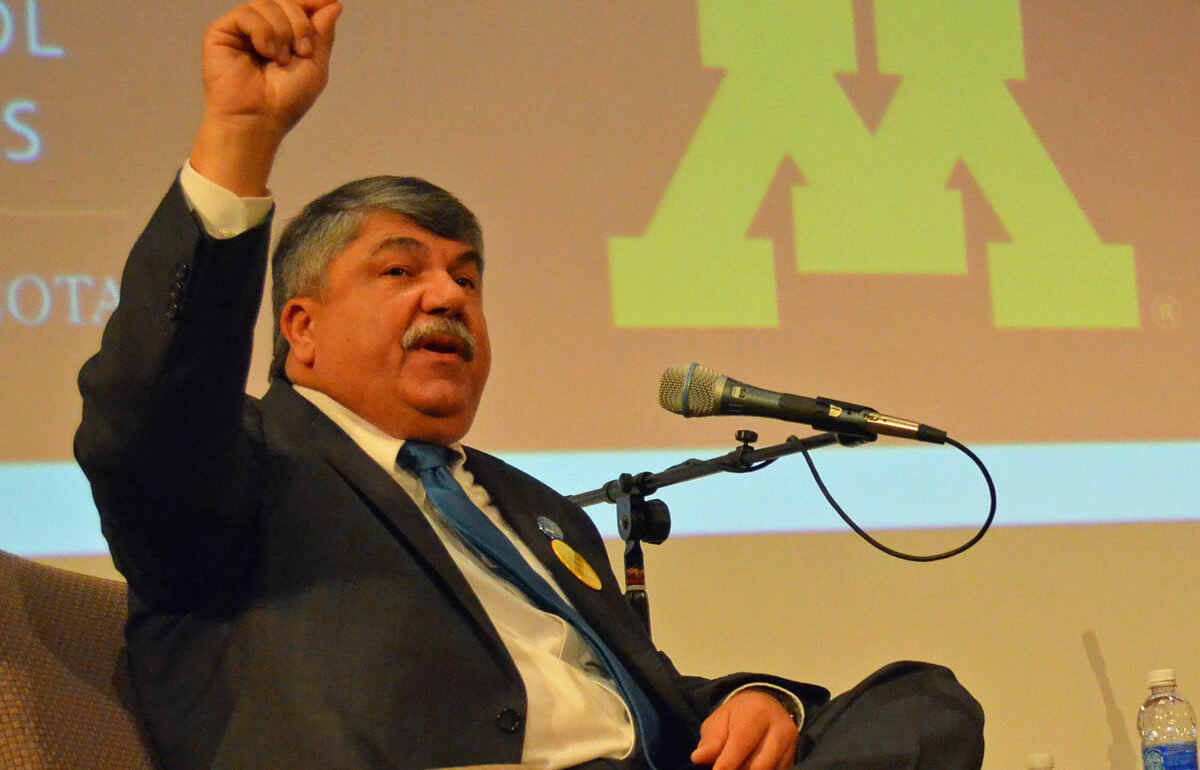

Share
In a policy address at the University of Minnesota, the nation’s highest-ranking labor leader pointed to “thousands of little groundswells” from across the country, including in the Twin Cities, as signs of a renaissance for collective action in American culture.
“Right now workers are standing together and asking for a better life – and standing together to get that better life,” AFL-CIO President Richard Trumka said. “There’s a way for workers to win, and it’s together.”
Trumka offered his remarks, entitled “The Right Deal for America, and the Political Path to Get There,” to students, faculty, labor leaders and other dignitaries, including former Vice President Walter Mondale, at the U of M’s Humphrey School of Public Affairs on Nov. 18.
The labor leader’s visit came a day after frontline workers at the university, members of AFSCME and the Teamsters, escalated their campaign for a fair contract with informational picketing on campus.
But Trumka did not shy away from standing in solidarity with their campaign for raises and respect. And he praised U of M faculty – his “soon to be brothers and sisters” – for taking steps to organize a union with SEIU Local 284 and gain a voice in shared governance at the university.
U of M workers, Trumka said, are among 5 million union members bargaining contracts this year, the most in recent history. It’s an opportunity, he said, for workers to get their “fair share” of an economic recovery built on their productivity and sacrifice.
“Raising wages will kick-start the greatest engine of economic growth the world has ever seen: a well-paid American workforce,” Trumka said.
The address touched on public policies and political issues that affect U.S. workers, including rising income inequality, legal challenges to collective bargaining, and trade deals like the Trans-Pacific Partnership that put corporate profits before middle-class jobs.
Those and other challenges, Trumka said, reflect the overwhelming influence of corporate money and the so-called “1 percent” on U.S. policymaking.
“The 1 percent have used every political and economic tool to drive down wages and divide working people … and they aren’t finished,” Trumka said. But he also likened corporate power to “a dinosaur that’s lived past its time” – big, vicious and “about to be pushed into extinction.”
How? Trumka pointed to the AFL-CIO’s Raising Wages Agenda, which “we’re pursuing right here in Minneapolis and St. Paul with a real vigor.”
The federation has come out strongly in favor of policies like a $15 minimum wage, fair scheduling and earned sick and safe time, and it’s given allies from outside the labor movement – worker centers and other groups advocating for gender equity, racial justice and immigrant rights – a real voice in the AFL-CIO’s power structure.
Trumka acknowledged flexibility and openness haven’t always been characteristics of the 60-year-old labor federation.
“There are a million little fires out there,” Trumka said. “It used to be if we couldn’t control them, then we didn’t want anything to do with them.”
After his address, Trumka answered questions in an informal exchange with Morris Kleiner, professor and AFL-CIO Chair in Labor Policy at the Humphrey School. The U of M established the position after receiving a contribution from the AFL-CIO in 1985, and it remains the only public affairs school in the U.S. with a dedicated AFL-CIO chair.

